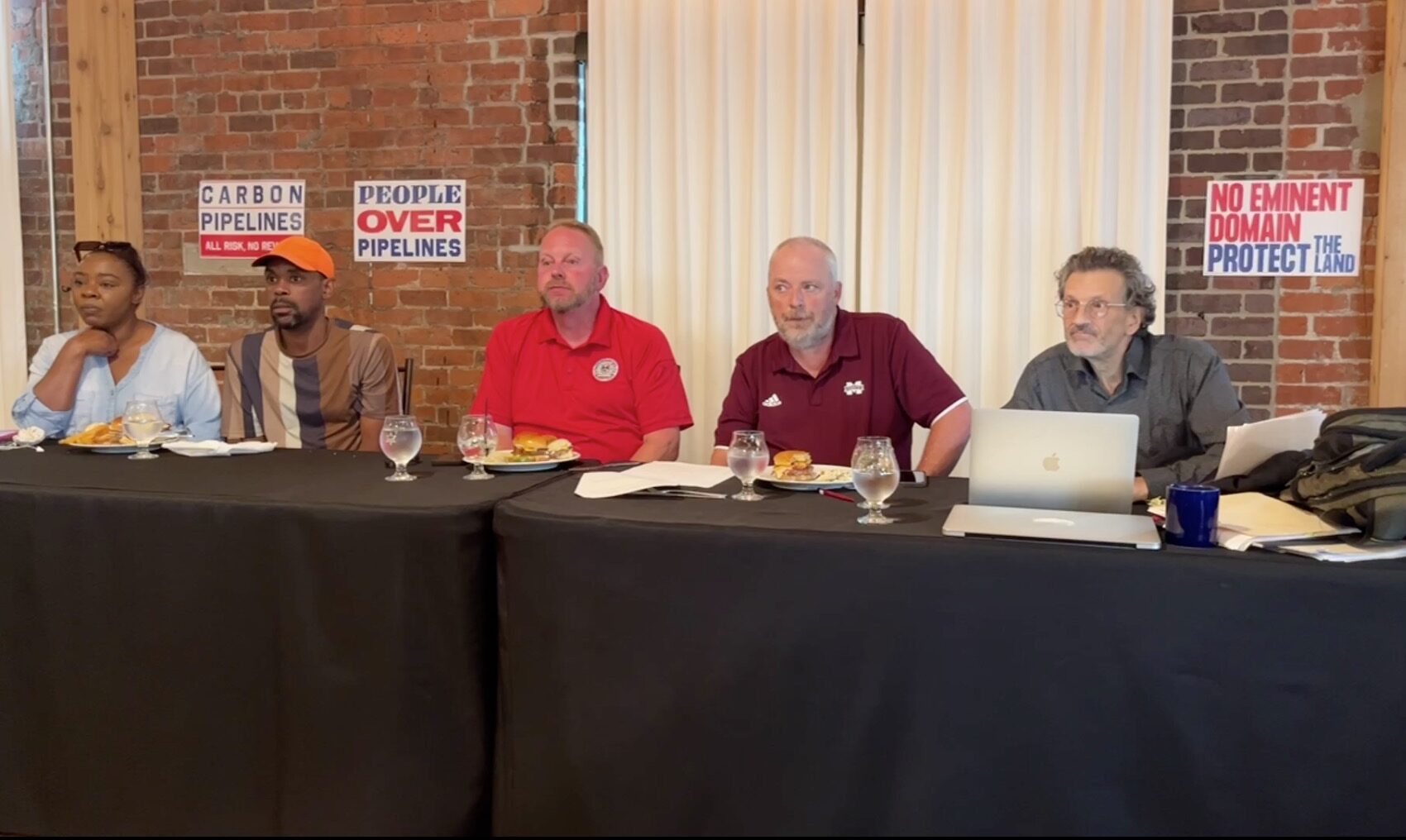Victims & First Responders from Satartia, MS CO2 Pipeline Rupture Speak Out Alongside Landowners During Federal CO2 Pipeline Public Safety Meeting
FOR IMMEDIATE RELEASE: June 1, 2023
Victims & First Responders from Satartia, MS CO2 Pipeline Rupture Speak Out During Federal CO2 Pipeline Public Safety Meeting in Des Moines
Bold Alliance delivers petition to U.S. Transportation Secretary Pete Buttigieg demanding urgent action on CO2 pipeline safety
Des Moines – Landowners and advocates from a half-dozen states converged on Des Moines, IA this Wednesday, May 31 and Thursday, June 1 to attend the U.S. Dept. of Transportation’s Pipeline and Hazardous Materials Safety Administration (PHMSA) “Public Meeting on Carbon Dioxide Pipeline Safety” to be held at the Des Moines Marriott Downtown. The Public Meeting focused on the thousands of miles of proposed carbon dioxide (CO2) pipeline projects that are pushing for permits and suing landowners via eminent domain to gain access to their land, and inform PHMSA’s current rulemaking it has undertaken to update federal carbon pipeline safety regulations.
During the event, Bold Alliance hosted a separate panel after the conclusion of the first day’s program featuring a number of first responders and victims from the 2020 Denbury carbon pipeline rupture in Satartia, Mississippi.
SPEAKERS:
- Gerald Briggs (Fire Coordinator, Warren County, MS)
- Jack Willingham (Yazoo County EMA Director)
- DeEmmeris “Debrae” Burns (Satartia victim)
- Dan Zegart (Journalist)
View the recording: “Satartia First Responders & Victims Panel”:
https://fb.watch/kUwjWi2gE-/
View press conference feat. Satartia first responders & victims:
Part 1
Part 2
Bold Alliance also delivered a petition during the event urging U.S. Secretary of Transportation Pete Buttigieg and PHMSA to issue a ruling that assures current regulations apply to pipelines carrying CO2 in all phases, and clear up the confusion and misinformation being spread by CO2 pipeline developers on what actions states, counties, and municipalities may undertake to protect their communities against the dangers of a CO2 pipeline rupture and other concerns. The petition included over 2,200 signatures and hundreds of written comments from concerned citizens.
View petition online:
https://actionnetwork.org/petitions/tell-sec-pete-take-action-now-on-co2-pipeline-safety
QUOTES FROM STATE ORGANIZERS & EASEMENT ACTION TEAMS
Iowa:
“Carbon pipelines are dangerous and there are too many unknowns to proceed with any pipeline approval process in any state. Too many lives and communities are at risk. We need PHMSA to put people, communities and infrastructure ahead of these greedy carbon pipeline land grabs,” said Jessica Mazour, Iowa Sierra Club
(Contact: 515-313-5253, jessica.mazour@sierraclub.org)
“Carbon capture pipelines were spurred into existence due to massive funding in the Infrastructure Bill, not the desire to create a better environment. Current regulations designed for the operation of gas and oil pipelines do not address the risks posed by hazardous CO2 pipelines. Jurisdiction between county, state, and federal entities is not clearly defined. Pipeline companies are using unethical tactics to obtain approval before they are required to abide by common sense regulations. As it stands, it is not a matter of “if” but “when” a hazardous CO2 pipeline ruptures with catastrophic results,” said Deb Main, impacted landowner and Iowa Easement Team organizer.
(Contact: 712 490-4097 deborah_main@yahoo.com / https://IAeasement.org)
Nebraska:
“Carbon pipeline companies and their unproven projects for carbon capture are due to government funding and greedy, out-of-state and foreign investors. Nebraska has zero state regulations or state agency that would give due process to landowners facing eminent domain on these types of pipelines. The risk is ALL on the landowner/farmer, not to mention the small rural communities not equipped to handle ruptures that will kill people and livestock. These companies want our land, water and energy to run the pipelines. We need PHMSA to put the rural people first who have worked the land all their lives and deserve to be treated fairly and with respect,” said Shelli Meyer, impacted landowner and Nebraska Easement Action Team organizer.
(Contact: 515-422-6136, shelli@boldalliance.org / https://NEeasement.org)
South Dakota
“The companies behind the slate of CO2 Pipeline proposals in the Midwest are licking their chops as the tax credit values continue to be increased, and updated rules from PHMSA appear distant. These companies are pushing in bad faith to get their projects through the states and counties before adequate and uniform regulations can be put in place, all to preserve their private profits over the safety and wellbeing of the people who will get stuck with the pipes!” said Chase Jensen, Dakota Rural Action & South Dakota Easement Team organizer.
(Contact: 605-697-5204, chase@dakotarural.org / https://SDeasement.org)
North Dakota:
“CO2 pipelines are dangerously under regulated — our rural communities are simply not ready for the mass buildout of these projects. The health and safety of the North Dakotans should be paramount — not corporate profits predicated on a carbon credit scheme,” said Eliot Huggins, Dakota Resource Council & North Dakota Easement Team.
(Contact: 231-313-5161, eliot@drcinfo.com / https://NDeasement.org)
View this press release online: [link]
About the Bold Alliance
The Bold Alliance is coordinating state-based groups with our Pipeline Fighters Hub and landowner legal groups called the Easement Action Teams to stop carbon pipelines from using eminent domain for private gain. We believe that carbon capture and storage (CCS) is unproven and overly expensive and wastefully incentivized approach to climate change, and that the carbon pipelines needed for CCS are poorly planned, under-regulated, and risky infrastructure. These huge and complex projects should not move forward until counties, states and the federal government prove first that they are a better climate solution than renewable energy, and second that safety, planning, and routing standards are in place to avoid inefficient chaotic development driven by wasteful federal spending. (https://boldalliance.org)




